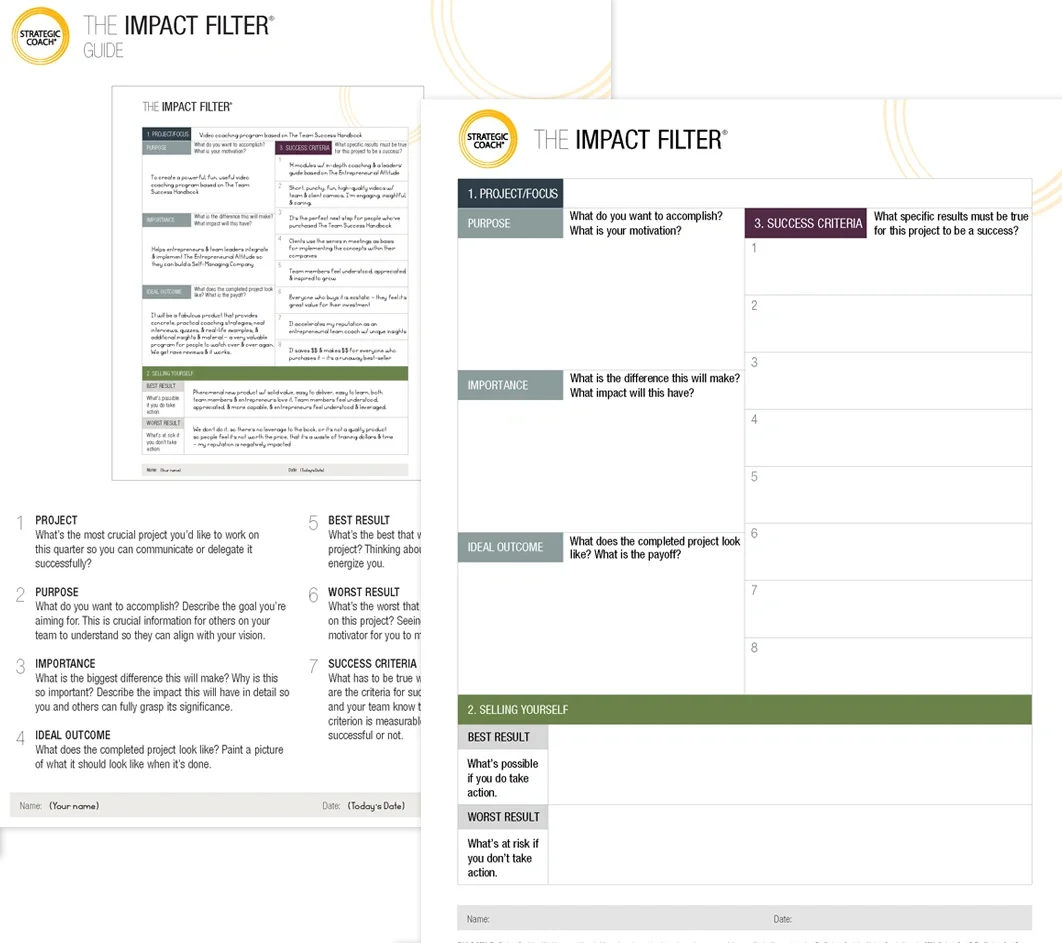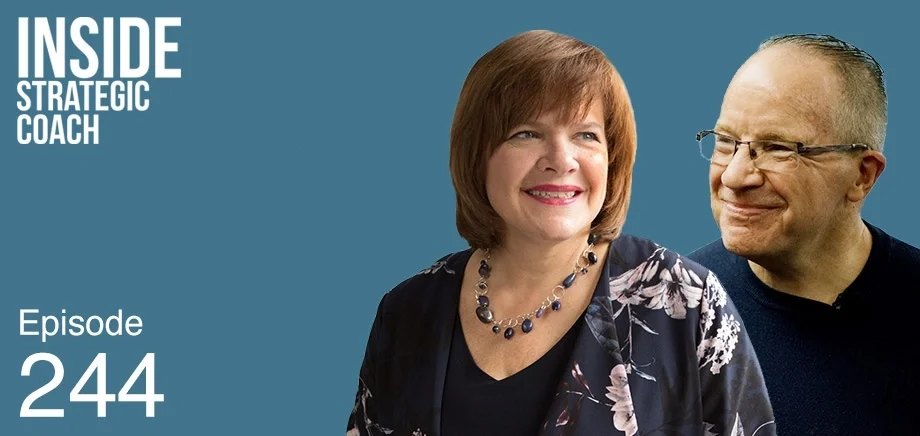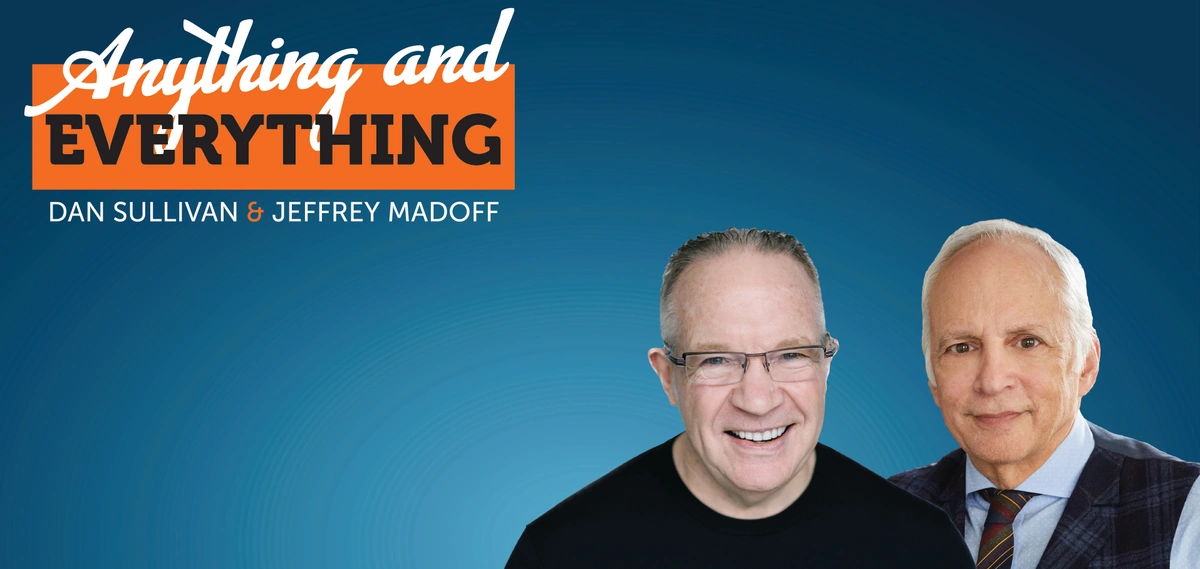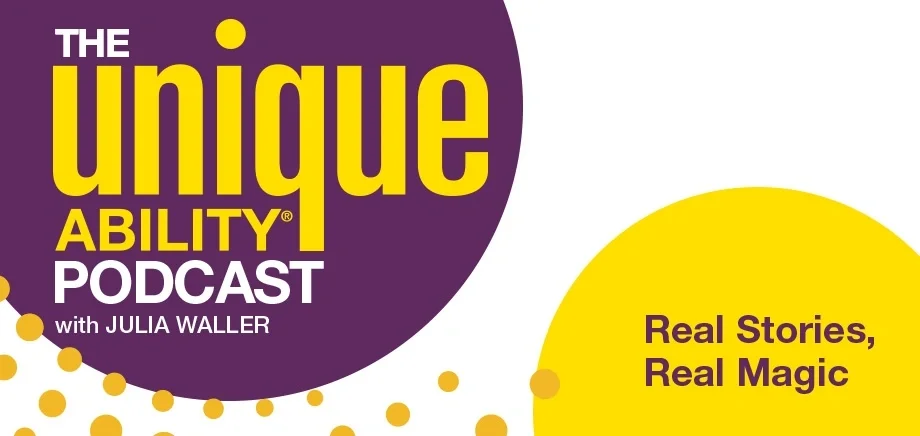The Emotional Edge Top Entrepreneurs Can’t Ignore
November 11, 2025
Hosted By
 Dan Sullivan
Dan Sullivan
 Shannon Waller
Shannon Waller
Do you ever wish difficult emotions would just disappear? In this episode, Dan Sullivan and Shannon Waller reveal why every feeling, especially the bothersome kind, is actually a valuable resource for entrepreneurial growth. Discover how turning frustration into clarity and action can lead to your next breakthrough, and learn the thinking tools that transform emotional energy into future results.
Here’s some of what you’ll learn in this episode:
- How technology has increased conversations about feelings in daily life.
- Why your feelings serve as a built-in warning system for your thinking.
- How to quickly gain clarity instead of staying stuck when something bothers you.
- Why others struggle to truly understand your personal feelings.
- How Dan’s own feelings inspired all of the Strategic Coach® thinking tools.
Show Notes:
Feelings are signals, not solutions—they alert you to something worth thinking about.
Feelings don’t transform themselves; vision and capability do.
The real power lies in transforming emotional energy into future-focused action.
Feeling “bothered” is raw material for entrepreneurial creativity and improvement.
Successful entrepreneurs treat bother as a resource, turning it into planning and innovation.
Asking, “If I weren’t bothered, what would I be doing?” can pivot your mindset and open new possibilities.
Responding thoughtfully, rather than reacting emotionally, leads to better results for you and your team.
You can’t control others’ reactions, but you can fully own your own process and responses.
Ignoring your feelings (or acting out impulsively) usually makes things worse.
Every feeling brings energy—use it to fuel thinking, problem solving, and the creation of new tools.
Mastery comes from skillfully transforming negative emotions into positive action, not from avoiding them.
The entrepreneur’s job is to turn low-productivity “bother” into high-productivity breakthroughs.
Don’t aim for perfect detachment; instead, get better at using what bothers you for future advantage.
Resources:
Not Being Bothered by Dan Sullivan
Multiplication By Subtraction by Shannon Waller
Episode Transcript
Shannon Waller: Hi, Shannon Waller here and welcome to Inside Strategic Coach with Dan Sullivan. Dan, you know I like to capture interesting things that you say so that I can ask you more about them on the podcast. So something you said the other day I found very thought-provoking and I wanted to know more. You said, "There's the feelings and there's the future. Feelings don't transform themselves; vision and capabilities do." I was like, phew. So that's what I would like to talk about. And when there are situations—it could be internal to a company, external—there's the feelings, but how we respond or take action on those feelings is what you said. And the fact that you said they don't transform themselves; vision and capabilities do, I was like, tell me more. So expand a little bit on that for me. What exactly do you mean?
Dan Sullivan: Well, first of all, everybody has feelings, just to start with. And my feeling is that the lack of success or the increase of success in your life is really a function of what you do with your feelings. And I think this is more so today than I certainly remember when I was a teenager in my 20s, that there seems to be an obsession with feelings today. And I think it has a lot to do with the communications that are possible, the technologies of communication. I grew up, you know, when telephones were party lines. Nobody had their own personal phone, and now everybody's got their iPhone or some other brand to do it. And that it seems to me that this technology has encouraged a 10x increase in people talking about their feelings. And so much so that the reality of their life is their feelings. But feelings are just feelings. Feelings are alerting you to something that needs to be thought about.
Shannon Waller: Feelings alert you to something that needs to be thought about.
Dan Sullivan: Yeah, you have to think about this. It's like a warning system. Something is causing you to not think in a proper way in the moment, in the moment. I mean, the feelings could be happy feelings. They don't have to be negative feelings, but feelings are not thinking. Feelings are an alert that said, "OK, something just happened that you're going to have to give it some thought." And the problem is that people are being told that something's wrong or, you know, something's right and you don't have to think about it. You know, that your feelings should be what other people take seriously. But since you don't understand your feelings, you haven't thought through them, other people can't really, really understand your feelings too. There's got to be thinking. I mean, the great power that humanity has, compared to the other species on the planet, is that we don't have to just react. We can actually pause and say, "OK, why am I feeling this way?"
And then your brain comes in and saying, "Yeah, you didn't approach that right. You know, the way that you got into this situation isn't doing you any good." And therefore you have to say, "Well, in the future, I'm going to do this differently so that I don't get this emotional response." So it's an invitation to thinking. It's either a demand that you think, or it's an invitation to thinking. And what's good for you is that you now use the energy—because feelings have a lot of energy—to use that energy now to think better in the future. And then look at a future result that's going to be different from where you are right now, and then think of the action path that's going to take you step by step to a future result. This is the way it was when you were three years old, when you were six years old, when you're 50 years old, when you're 80 years old, you know. We're given our feelings for a reason, but you have to do some thinking to figure out what the reason was.
Shannon Waller: So this is great, Dan. What I'm hearing is, take them seriously. Pay attention. Ignoring them can lead to other issues. But also, don't stop there. Use them to think through things differently based on a vision. If you like something, how do you do more of it? If you don't like something, how can you transform it in the future, right? So that's, is that the vision part that you're talking about?
Dan Sullivan: Yeah.
Shannon Waller: Yeah, and it's interesting, Dan, because I know you're someone who's incredibly thoughtful, very strategic, all the things, but you also feel things very strongly, right? And I think about all of the thinking tools that you have created are, first of all, for you.
Dan Sullivan: Well, they all came out of a feeling of something's not right here. Or something happens, and all of a sudden, it didn't happen the way I thought it was going to happen. And there's a surprise, and you can get paralyzed by that. You're just paralyzed in the moment. But then if you just react, without any thinking, my experience is, it generally ends up even worse. If you have an emotional, strong emotional feeling and a lot of energy, but you just act out, you know, my experience is, you know, going back 80 years, anytime I've done that, it hasn't done me any good. It actually makes things worse.
Shannon Waller: It does. It's true. So what are some of the tools, Dan, that you have created out of an experience where something didn't go the way you wanted it to?
Dan Sullivan: Well, I've got a series of just thoughts, I think. One is that I use the word "bother." "This bothers you." I've taught myself that when something bothers me, I say to myself, "OK, you're bothered. Now, if you weren't bothered, what would you be doing?" And what it immediately does, it clarifies that there's a part of me that's bothered, but "What would I be doing?" immediately engages my brain. And in a lot of situations, like if it's in a discussion and I'm bothered by it, I say to myself, "If I wasn't bothered, what would I be doing?" I said, well, first of all, I'd keep my mouth shut. You're not gonna say anything for the next minute or two minutes or five minutes. Don't say anything. Just be cool. Just really be cool. And now kind of think of something that's actually a thoughtful response. Or in some states, you just say, don't respond. Don't respond. Just take it in, cool down. Now you're alert. And now you're thinking, okay, is there a way of talking about this? Or is there a way of deciding on something? Or is there a way of taking an action that will give you a reward for having not reacted?
Shannon Waller: Interesting.
Dan Sullivan: Yeah, and I have talked to people and I says, "Can I ask you a question? If you weren't bothered by this, what would you be doing now?" And immediately they realize that I've noticed that they're bothered, which is useful, but then I've asked a question and their brain has to respond to the question, what would you be doing? And immediately it's not being bothered. Being bothered is the start of something, but it's not the answer to anything.
Shannon Waller: Right, right. Are you ever able to solve the bother or do you just bypass it? What's your experience with that?
Dan Sullivan: Yeah, well, you can't solve a bother. A bother is just a bother. I think what happened is that they had a plan for how things were going to go. When we get in any situation, we have a previous experience that tells us, well, this is probably how this is going to go. Except in this case, it didn't go that way. And you're bothered. And it's just, OK, now that plan A is not working, what's plan B? And you get going on plan B. But there's this thing that somehow being bothered has a great meaning to it. No, it's that you're bothered. What it means is, change of game. There's a new game that's possible. And what I've taught to do it, because it's my life as an entrepreneur, is creating new things. So I say out of this being bothered now, in order to get a reward for having gone through a painful experience, I'm going to create something brand new. And I got a lot of energy to do it. The one thing the bother brings with it is a lot of energy. It's negative energy. How do I turn it into positive energy? What's the way of doing it? All my life, I've spent all my time with me. So I can't really be in control of other people's experience, but I can be in control of my own experience.
Shannon Waller: I love that, in control of my own experience. It's interesting, Dan, in what I know about you, and I've known you for 34 years, going on 34, well, since 1991, put it that way, a long time, is you keep, I'm not sure if you would agree with my way of putting it, but mastering your own responses to situations. And as a result, you are way less bothered, and you transform them very quickly. And if you want a different result, you will create a thinking tool, or a process, or a communication, or an Impact Filter, or whatever it is, to get that different result. But you don't spread your bother onto other people. Do you know what I mean? Like, I can see if something bugs you, but you don't lash out at others like I did last week. You're like, you take it inside, transform it, and come back with a new course of action, which I think is what you talk about, there's feelings and there's the future. You are focused on the future, like transforming that so you can have a different, better future. Do I have that right?
Dan Sullivan: No, I think that's very accurate. It certainly captures what my intention is of how I would like to behave if something bothers me. I'm kind of being a problem to myself, but my intention would be, don't be a problem for somebody else because you're bothered. So I try to keep the experience local, namely inside me. But I do notice that a lot of my creativity comes from successfully transforming feelings of bother into a new possibility and a new action. So I don't think it's a bad thing. I'm always going to be bothered. The other thing is, I don't tell myself, you know, "Don't be bothered." You know, I say, "Detach yourself so that you won't be bothered." I don't want to detach myself. I want to be fully engaged. But I have to take 100 percent responsibility that this is entirely my responsibility for taking this negative bother and turn it into something positive.
Shannon Waller: So just to break down the word "responsibility." People always think it means "blame." It means "able to respond." Not able to react, but able to respond. And so 100% responsibility means that you are owning your response to that situation. And Dan, years and years ago, you wrote something on emotional adulthood. This strikes me as that's what you are doing when you take ownership over the situation. So that to me is cool. But I want to go back to being bothered is you're not trying not to be bothered. You're not being bothered by being bothered, okay? But like you, it is a massive source of creativity. Why did I create the Entrepreneurial Attitude exercise? Because I was frustrated. Why did I write Multiplication By Subtraction? Because I kept seeing the wrong people in the company, you know, in my clients' companies. So it is such a huge source of creativity because in that transformation, it can be useful for you and for other people. I appreciate that because sometimes I can feel bothered about being bothered, and if you just stay chill about it, stay cool, then you're like, oh, I could write something about that, I could talk about something, I could do a podcast. So that is actually just raw material.
Dan Sullivan: Yeah, you know, this is one person's experiment, and it's one person's way of solving something that happens all the time. I never expect there to be anytime in the future where I'm not bothered by something. So my whole point is, just become more and more skillful at taking that bother and turning it into new ways of handling things that are not only useful for me, but they're also properly packaged. They're useful for other people. I mean, I don't think I'm unique in this. My feeling is, to be human is to be bothered.
Shannon Waller: To be human is to be bothered, that's perfect.
Dan Sullivan: The question is, what do you do with the bother?
Shannon Waller: Right. Yes. And Dan, where I do think you're unique is just with the sheer volume of thinking tools that you come up with to transform those feelings into something. You're, you know, a tool maker is what will be your epitaph will be, which is really fun. So you actually give thinking tools, which, you know, is thinking about your thinking. To add to that, thinking about your feelings sometimes, but bringing it from that, you know, reactive brain that we have that keeps us alive into something that is in our prefrontal cortex, which you can do, as you said, something creative with it that can be useful for you and for others. I love it because there's a feelings and there's a future. If we stay stuck in the feelings, your future looks exactly the same as how you're feeling right now. So it's that desire to have a better future and then the capabilities, which are so great at creating.
Dan Sullivan: Yeah. Another aspect of this, I just thought of it as you were talking about it. It keeps me in touch with who I was right from the beginning, because the emotion that goes along with being bothered right now, that feeling is exactly the same as when I was eight years old. Now I'm 80. And since I've learned how to transform bother into creativity, I really appreciate how I'm not embarrassed that I'm bothered. Okay, that's it.
Shannon Waller: This is so good.
Dan Sullivan: I'm not embarrassed by that because, one is that I think everybody is, but I'm very, very proud of the amount of intelligence that I brought to this particular experience. OK, and I don't have any desire to get rid of it. I don't have any desire to have a future where I'm not bothered. It's just that I feel very happy, I feel very, very satisfied that I've learned how to make something which seems to be totally negative into something that's very positive. And I feel really great, and it unifies my whole life. I've been at this from the start, and I'm just a lot better at it now.
Shannon Waller: First of all, thank you, because your tools have been very useful for my own transformation of my feelings into action. And I do that in my area as well, most of the time. But I think one of the profound things that you said is you're not trying in the future to not be bothered. And I think that's what I hear. I don't love the word narrative. But that's what I hear a lot out there is like, oh, I want to get to a point where I'm totally Zen, or detached, as you were talking about a minute ago. And that's not you, you are fully in it, fully present, knowing you're going to be bothered. And there's no future where you're not, because you've turned what could be bothersome into, again, a source of creativity, and you're proud of that capability. It's just refreshing, all right? It's refreshing to know that that is the future, and I don't have to be fussed about it. It's like, yeah. And as I grow and become more capable, different things will bother me. They may not be the same things as before, but that's interesting, and I can actually anticipate that and look forward to it. So that is a very unique perspective. I appreciate it very much.
Dan Sullivan: You know, the original definition of entrepreneurism is someone who takes resources from a lower level of productivity to a higher level of productivity. Well, I just consider bother a resource. It's not a very productive resource. And thinking about it and, you know, creating new thoughts, creating new possibilities is a way of taking a resource... Being bothered is a resource, and I can take it to a higher level of productivity. And namely, it becomes a thinking breakthrough, a planning breakthrough, an action breakthrough. But unless you have the bother, you don't get the breakthrough.
Shannon Waller: Yeah, unless you've got the bother, you don't have the breakthrough. There's so many things I'm walking away from this. So in terms of action steps, first one would don't be bothered about being bothered. That's a really good one. And then, transform it. You raised such a great point, Dan. The opportunity there, there's a lot of emotional energy when you're bothered. There's scales of this, of course, but we can use that productively rather than just reactively. So we can take a creative response or we can have a reactive response. We talk about that in our Experience Transformer framework. But it's so cool. So I think the takeaway is, take something that's bothering you and think about it, take it seriously, but then get creative and look if you can't create something new and better for a better future out of that bother. That is a great and useful takeaway, Dan. Thank you so much.
Dan Sullivan: Thank you, Shannon.
Related Content
The Impact Filter®
Dan Sullivan’s #1 Thinking Tool
Are you tired of feeling overwhelmed by your goals? The Impact Filter is a powerful planning tool that can help you find clarity and focus. It’s a thinking process that filters out everything except the impact you want to have, and it’s the same tool that Dan Sullivan uses in every meeting.







